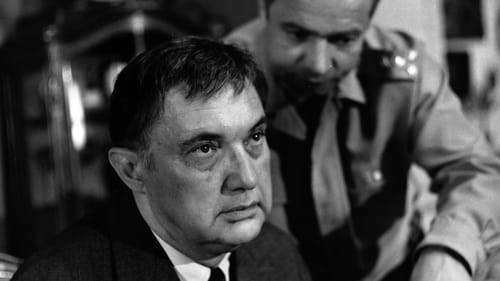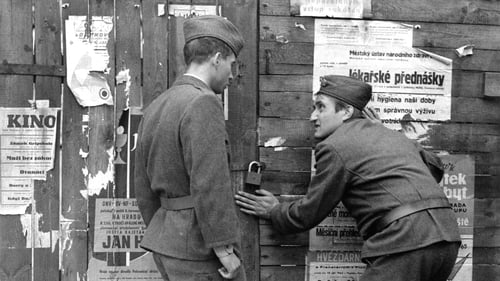
Čuřimil

At the Ronov castle, the archive-keeper professor Nykl (Milos Nedbal) is searching for the lost painting The Naked Shepherdess by the famous Fragonard. Nykl is just about to disassemble the mantelpiece in the knight's hall, convinced that the painting must be hidden somewhere inside. His efforts, however, meet the strong disapproval of the castle manager, Anna Juzová (Jirina Petrovická), who knows very well where The Naked Shepherdess is. She wants to get hold of the painting herself, to emigrate and smuggle it along. In fact, Anna deals with forgeries of the most distinguished old masters, selling them abroad. The copies are made for her by the painter and restorer Maudr (Martin Ruzek) and the certificates of authenticity are issued by Anna's companion - expert Laburda (Karel Höger). One day, Anna is found murdered in front of the castle's fireplace.

Jurácek's feature debut is shot in two parts. In the first, a corporal accompanies a new recruit with a sore Achilles tendon for his physical, and all the girls or young women they see are played by the same actress (Ruzickova). In the longer second segment, shot with the help of the Czechoslovakia army, the soldiers pass the time during basic training and maneuvers by talking about girls.

The work of actors on a stage makes a dreamlike parallelism between artistic immagination and the concreteness of everyday life. Tribute to Prague's Divadlo na zàbradlì, theater that has been a point of reference for Theater of the Absurd in Czechoslovakia in Sixties

In 1965, the experienced director Jaroslav Mach made a documentary film with staged scenes, which dealt with the current problems of popular Czech sport. Behind the scenes of football, the playmakers looked through slavoje's team, which is preparing for the decisive match. If Coach Ram doesn't force his boys to perform convincingly, they're in danger of relegation to league two. After a series of dramatic peripeteias, Slavoj takes the field so weakened that he is caught up in the dreaded failure. Fortunately, the club's fans will eventually take their anger out on the loss of "their" team to an innocent referee. The film also features criticism of officials... In addition to actors Martin Růžek and Bohumil Šmída, Machov's film appeared real footballers Dukla and period sports stars (e.g. František Plánička).


Действие фильма происходит весной 1918 года. Чехословацкие солдаты и офицеры, вернувшиеся из русского плена, размещены в казармах чешского городка Румбурка. Свой досуг военные проводят в местном мюзик-холле, где блистает дива по прозвищу «Полынь». В случае лояльности по отношению к австрийской армии им обещана спокойная тыловая служба. Внезапно приходит приказ отправиться на итальянский фронт. Солдаты недовольны. Чаша их терпения переполняется. Возвращаясь из плена в России, под влиянием Октябрьской революции, они знают, как что делать. Возникает стихийный протест, чехи идут на захват вокзала, почты, жандармерии, но мятеж жестоко подавлен австрийцами. Пять наиболее активных участников бунта казнены.

Judge
Во время второй мировой войны Мария Влачилова работала на кухне в небольшом лагере для военнопленных, где была свидетельницей многих злодеяний гитлеровцев. Прошли годы. Однажды ее вызывают в Мюнхен, где ведется следствие по делу бывшего коменданта лагеря. Влачилова - единственный свидетель убийства военнопленных. Она собралась в путь, но в последний момент отдала свой билет другой женщине. В пути эта женщина оказалась убитой. После этого случая Влачилова отказалась ехать в Мюнхен, тем более что ее показания на судебном процессе могли бы повредить карьере мужа ее дочери, которая живет в Западной Германии.


В центре фильма — история семейной династии, связанной с пражским «Колбенко», заводом ЧКД по производству локомотивов. Дедушка Антонин, уже пенсионер, сын Рудольф, мастер цеха сборки локомотивов, и внук Антонин, перспективный футболист. В фильме также рассказывается история дочери Рудольфа Веры — каждое поколение имеет свои представления о жизни и не может идентифицировать себя с другими. Это реалистическая концепция жизни рабочего класса, не обремененная идеологией.






